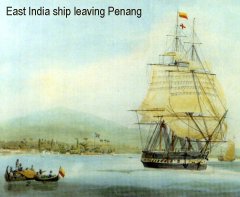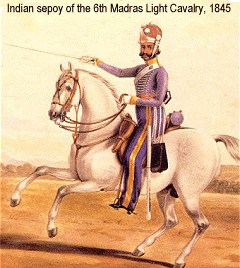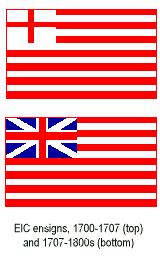Agent of Empire
The East India Company
 The
English East India Company was the most unique organization in British
colonial history. Starting as a monopolistic trading body, the company
became involved in politics and acted as an agent of British
imperialism in India and Southeast Asia from the early 18th century to
the mid-19th century. In addition, the activities of the company in
China in the 19th century served as a catalyst for the expansion of
British influence there. The
English East India Company was the most unique organization in British
colonial history. Starting as a monopolistic trading body, the company
became involved in politics and acted as an agent of British
imperialism in India and Southeast Asia from the early 18th century to
the mid-19th century. In addition, the activities of the company in
China in the 19th century served as a catalyst for the expansion of
British influence there.
 Formally
called the 'Governor and Company of Merchants of London Trading into
the East Indies', and later the 'United Company of Merchants of England
Trading to the East Indies', the East India Company (EIC) was formed
for the exploitation of trade with East and Southeast Asia and India.
Queen Elizabeth I of England granted a charter to the EIC, awarding it
a monopoly of the trade with the East. The EIC arose from a grouping of
London merchants, ordinary city tradesmen and aldermen who were
prepared to take a gamble in buying a few ships and filling them with
cargo to sell in the East. At the end of the voyage, after the return
cargo was sold, the profits would be shared amongst the share holders.
This system was known as "joint-stock". Formally
called the 'Governor and Company of Merchants of London Trading into
the East Indies', and later the 'United Company of Merchants of England
Trading to the East Indies', the East India Company (EIC) was formed
for the exploitation of trade with East and Southeast Asia and India.
Queen Elizabeth I of England granted a charter to the EIC, awarding it
a monopoly of the trade with the East. The EIC arose from a grouping of
London merchants, ordinary city tradesmen and aldermen who were
prepared to take a gamble in buying a few ships and filling them with
cargo to sell in the East. At the end of the voyage, after the return
cargo was sold, the profits would be shared amongst the share holders.
This system was known as "joint-stock".
 Huge profits were made
from the initial and difficult voyages to Southeast Asia, mainly from
the sale of pepper acquired from the Sumatran and Javanese trading
ports and sold in London. Soon, the EIC was building more and bigger
ships and increasing the number of shareholders. Huge profits were made
from the initial and difficult voyages to Southeast Asia, mainly from
the sale of pepper acquired from the Sumatran and Javanese trading
ports and sold in London. Soon, the EIC was building more and bigger
ships and increasing the number of shareholders.
The company was formed to share in the East Indian spice
trade. This trade had been a monopoly of Spain and Portugal until the
defeat of the Spanish Armada (1588) by England gave the English the
chance to break the monopoly. Until 1612 the company conducted separate
voyages, separately subscribed. There were temporary joint stocks until
1657, when a permanent joint stock was raised.
 The company met with
opposition from the Dutch in the Dutch East Indies (now Indonesia) and
the Portuguese. The VOC's policy was a monopoly on trade in spices,
pepper and other commodities in the region., The Dutch virtually
excluded company members from the East Indies after the Amboina
Massacre in 1623 in which English, Japanese, and Portuguese traders
were executed by Dutch authorities. The company met with
opposition from the Dutch in the Dutch East Indies (now Indonesia) and
the Portuguese. The VOC's policy was a monopoly on trade in spices,
pepper and other commodities in the region., The Dutch virtually
excluded company members from the East Indies after the Amboina
Massacre in 1623 in which English, Japanese, and Portuguese traders
were executed by Dutch authorities.
After the massacre, and owing to the high costs of financing
its voyages to the archipelago, the EIC turned its attention to India
where it already had a factory at Surat. At that time, Surat was the
main port of trade between India and Europe. Although the EIC turned to
India, it did not completely withdraw from the Malay archipelago. It
kept its factory at Bencoolen on the west of coast of Sumatra.
 At this time, the Indian market became more attractive
for English goods. but the company's defeat of the Portuguese in India
(1612) won them trading concessions from the Moghul Empire. The company
settled down to a trade in cotton and silk piece goods, indigo, and
saltpetre, with spices from South India. It extended its activities to
the Persian Gulf, Southeast Asia, and East Asia. At this time, the Indian market became more attractive
for English goods. but the company's defeat of the Portuguese in India
(1612) won them trading concessions from the Moghul Empire. The company
settled down to a trade in cotton and silk piece goods, indigo, and
saltpetre, with spices from South India. It extended its activities to
the Persian Gulf, Southeast Asia, and East Asia.
 From the mid 1600's
onwards, the EIC slowly began to acquire territory in India (Madras,
Bombay and Calcutta). During this period also, the EIC was allowed to
raise its own military force. In 1689, the EIC issued a formal
declaration of its intention to be a territorial power in India, thus
revising its earlier commercial aims. By the 1700s, the French were
becoming involved in India too. From the mid 1600's
onwards, the EIC slowly began to acquire territory in India (Madras,
Bombay and Calcutta). During this period also, the EIC was allowed to
raise its own military force. In 1689, the EIC issued a formal
declaration of its intention to be a territorial power in India, thus
revising its earlier commercial aims. By the 1700s, the French were
becoming involved in India too.
The eighteenth century was a very important period in the
EIC's history. The EIC expanded into Northern India and was
increasingly involved in the China Trade. In London, the Company's
office headquarters was improved to reflect its importance as a great
company of the world.
 With the world's
silver deposits being in the hands of enemy nations such as Spain, the
EIC found it difficult to pay in silver for increased imports of
Chinese tea and silk. It turned to Southeast Asian produce as another
form of payment. The EIC also hoped to attract Chinese junks to an
entrepot in the archipelago where the terms of exchange would be more
favourable to the EIC. It was this that led to the establishment of
Penang and Singapore and eventual British domination of the Malay
peninsula. With the world's
silver deposits being in the hands of enemy nations such as Spain, the
EIC found it difficult to pay in silver for increased imports of
Chinese tea and silk. It turned to Southeast Asian produce as another
form of payment. The EIC also hoped to attract Chinese junks to an
entrepot in the archipelago where the terms of exchange would be more
favourable to the EIC. It was this that led to the establishment of
Penang and Singapore and eventual British domination of the Malay
peninsula.
After the mid-18th century the cotton-goods trade declined,
while tea became an important import from China. Beginning in the early
19th century, the company financed the tea trade with illegal opium
exports to China. Chinese opposition to this trade precipitated the
Opium War (1839-42), which resulted in a Chinese defeat and the
expansion of British trading privileges; a second conflict, often
called the "Arrow" War (1856-60), brought increased trading rights for
Europeans.
 The
original company faced opposition to its monopoly, which led to the
establishment of a rival company and the fusion (1708) of the two as
the United Company of Merchants of England trading to the East Indies.
The United Company was organized into a court of 24 directors who
worked through committees. They were elected annually by the Court of
Proprietors, or shareholders. When the company acquired control of
Bengal in 1757, Indian policy was until 1773 influenced by
shareholders' meetings, where votes could be bought by the purchase of
shares. This led to government intervention. The
original company faced opposition to its monopoly, which led to the
establishment of a rival company and the fusion (1708) of the two as
the United Company of Merchants of England trading to the East Indies.
The United Company was organized into a court of 24 directors who
worked through committees. They were elected annually by the Court of
Proprietors, or shareholders. When the company acquired control of
Bengal in 1757, Indian policy was until 1773 influenced by
shareholders' meetings, where votes could be bought by the purchase of
shares. This led to government intervention.
The Regulating Act (1773) and Pitt's India Act (1784)
established government control of political policy through a regulatory
board responsible to Parliament. Thereafter, the company gradually lost
both commercial and political control. Its commercial monopoly was
broken in 1813, and from 1834 it was merely a managing agency for the
British government of India. It was deprived of this after the
catastrophe of the Indian Mutiny in 1857, and it ceased to exist as a
legal entity in 1873.
Write to the author: sabrizain@malaya.org.uk
The
Sejarah Melayu
website is
maintained solely by myself and does not receive any funding
support from any governmental, academic, corporate or other
organizations. If you have found the Sejarah Melayu website useful, any
financial contribution you can make, no matter how small, will be
deeply appreciated and assist greatly in the continued maintenance of
this site.
|
|

